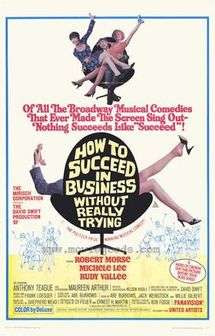How to Succeed in Business Without Really Trying (film)
| How to Succeed in Business Without Really Trying | |
|---|---|
 Theatrical release poster | |
| Directed by | David Swift |
| Produced by |
David Swift Walter Mirisch Irving Temaner |
| Screenplay by | David Swift |
| Story by |
Abe Burrows Jack Weinstock Willie Gilbert |
| Based on |
How to Succeed in Business Without Really Trying by Shepherd Mead |
| Starring |
Robert Morse Michele Lee Rudy Vallee Anthony Teague |
| Music by |
Frank Loesser (Songs) Nelson Riddle (Incidental music) |
| Cinematography | Burnett Guffey |
| Edited by |
Allan Jacobs Ralph E. Winters |
Production company | |
| Distributed by | United Artists |
Release date |
|
Running time | 121 minutes[2] |
| Country | United States |
| Language | English |
| Box office | $2,900,000 (rentals)[3] |
How to Succeed in Business Without Really Trying is a 1967 musical comedy film based on the 1961 stage musical of the same name, which in turn was based on Shepherd Mead's book. The film was produced by United Artists and directed by David Swift, with original staging by Bob Fosse.
The cast includes Robert Morse and Rudy Vallee (reprising their original Broadway roles), Michele Lee, Anthony Teague, Tucker Smith (in an uncredited role), and Maureen Arthur. The film marks the debut of Lee.
Plot
J. Pierrepont Finch (Robert Morse) buys a book, How to Succeed in Business, describing in step-by-step fashion how to rise in the business world. The ambitious young window cleaner follows its advice carefully. He joins the "World-Wide Wicket Company" and begins work in the mailroom. Soon, thanks to the ethically questionable advice in the book, he rises to Vice-President in Charge of Advertising, making sure that each person above him gets either fired or moved or transferred within the company.
Finch begins to fall in love with Rosemary Pilkington, a secretary at the company. Finch finds out that the president of the company, J. B. Biggley, has made advances towards Hedy LaRue, a beautiful but incompetent woman the company has hired. Finch uses this information to assist his climb on the corporate ladder.
Biggley's annoying nephew, Bud Frump, also takes advantage of the situation and tries to get to the top before Finch. By story's end, however, Finch has become chairman of the board, and might make the White House his next step to success.
Cast
- Robert Morse as J. Pierrepont "Ponty" Finch
- Michele Lee as Rosemary Pilkington
- Rudy Vallee as J.B. Biggley
- Anthony Teague as Bud Frump
- Maureen Arthur as Hedy LaRue
- John Myhers as Bert O. Bratt
- Carol Worthington as Lucille Krumholtz
- Kay Reynolds as Miss Smith / Smitty
- Ruth Kobart as Miss Jones
- Sammy Smith as Twimble / Wally Womper
- Jeff Debenning as Gatch
- Janice Carroll as Brenda
- Robert Q. Lewis as Tackaberry
- Paul Hartman as Toynbee
- Dan Tobin as Johnson
- John Holland as Matthews
- Justin Smith as Jenkins
- Murray Matheson as Benjamin Ovington
- Patrick O'Moore as Media Man No. 1
- Lory Patrick as Receptionist
- Wally Strauss as Media Man No. 2
- Hy Averback as 2nd Junior Executive
- George Fenneman as Himself/T.V. Announcer
- Carl Princi as 1st Junior Executive
- Sheila Rogers as 1st Girl
- Robert Sweeney as 3rd Junior Executive
- Ivan Volkman as The President (at end of musical)
- Anne Seymour as Gertrude Biggley (uncredited)
- Erin O'Brien-Moore as Mrs. Frump (uncredited)
Production notes
The Union Carbide Building (now the JPMorgan Chase Tower) at 270 Park Avenue in New York City was used in exterior shots as the headquarters for the "World-Wide Wicket Company" in the movie, most notably in the sequences in which Finch dashes into the building before his boss arrives in order to arrange coffee cups on his desk and pretend to have fallen asleep on it after apparently working all night, as a way to convince his boss to promote him to a higher position in the company.[4]
Reception
The film received generally positive reviews; it currently holds an 89% "fresh" rating on Rotten Tomatoes.[5]
Although the original musical had been a great Broadway success, capturing seven Tony Awards, the film version was not nominated for any Academy Awards.
DVD
How to Succeed in Business Without Really Trying was released to DVD on April 1, 2003 by MGM Home Video in a Region 1 DVD and is available on Region 2 DVD from Simply Media.
Blu-ray
How to Succeed in Business Without Really Trying was released to Blu-ray on March 14, 2017 by Twilight Time in a Region A Blu-ray.
See also
References
- ↑ "How to Succeed in Business Without Really Trying (1967) - Release dates". Internet Movie Database. Amazon.com. Retrieved 2012-01-08.
- ↑ "HOW TO SUCCEED IN BUSINESS WITHOUT REALLY TRYING (U)". British Board of Film Classification. 1967-03-01. Retrieved 2012-01-08.
- ↑ "Big Rental Films of 1967", Variety, 3 January 1968, pg 25.
- ↑ How to Succeed In Business Without Really Trying, YouTube
- ↑ How to Succeed in Business Without Really Trying at Rotten Tomatoes